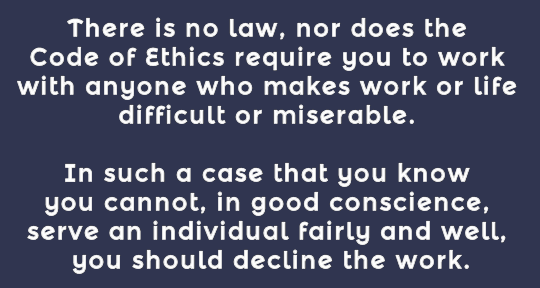If we have learned anything about ourselves in the past 10 days, it’s that there are some people in this world we will never be able to understand or condone. Between the skirmishes in Charlottesville, VA, and the killings in Barcelona and elsewhere; I am reminded that I will NEVER understand hate. I will NEVER condone racism, or neo-nazi-ism, or jihad, or white supremacy – or killing. Period.
As I watched it all unfold through the news, I asked myself, What would I do if one of those people whose attitudes and opinions I find so repugnant asked me to be their advocate?
The answer came easily. I would say no.
I’m guessing that most of you would want to say NO, too – but would not know how to do so. So I am providing you here with justification and tactics to effectively, legally, and ethically draw a line between who we will, and who we won’t, provide advocacy services to.
Who we WILL work with – is fairly easy. We’ll serve almost anyone who needs our skill set, in a geography we can serve, who is willing to sign our contract, who can afford to pay us to do that work.
Who we WON’T or DON’T WANT to work with – is more complex, in particular because of our Code of Ethics and Professional Standards, and possibly because of the law.
To be VERY clear: I am NOT talking refusing to do business with people who are simply different from us. I am not talking about denying service to someone of a different gender, or race, or culture, or ability from yours or mine. Our Code of Ethics is very clear on those points and none of those differences is justification to decide against working with someone.
I AM talking about refusing services to people we can’t respect because of their demeanor or behavior. Maybe they have violent tempers, have lied to you, or are non-cooperative, or too critical. It might be that next door neighbor who once threatened to sue you because your tree drops leaves in her yard, or the guy who won’t shut up about his hatred for people of a certain color or religion, or your ex who, despite the fact that you begged him throughout your marriage to stop smoking, has now been diagnosed with lung cancer and wants you to be his advocate – over protest from his fourth wife.
How do you say no to doing business with that person?
[Sidebar: There are those among us who would see an opportunity to change that person’s behavior, or to influence them to see the world differently. I say, forget it. When someone is sick and scared, attempting to alter their opinions and thought processes during such a trying personal time is at least presumptuous, but more likely, simply a waste of time and effort.]
Saying NO Requires Two Things: Justification and a Tactic
Justification: Simply put: when you detest or fear the thought of working with someone, then you will not perform to the highest quality standard. You won’t have the mental or emotional ability to serve them well.
No patient-client deserves anything less than 100% of your efforts. If your head just isn’t there, if you lack respect for that person, you won’t be able to give 100%. In fairness to them, and in keeping with the high level of quality our profession demands, you must decline their request.
That is the only justification you need. So – how do you go about saying no?
Tactics:
When I owned my marketing company (in the days before my patient empowerment and advocacy work), on occasion an inquiry about my services would come from someone I knew and didn’t want to work with again, or I knew by reputation was extremely difficult to work with, or someone I didn’t know at all, but their phone call or email was caustic, or demanding, or anything else that sent up red flags.
Personally, I found it extremely difficult to just say no without an explanation, no matter how little respect I had for them. I felt as if I needed to handle their rejection more professionally than simply turning them away.
Such consideration is even more important for someone who is sick and scared. It is never acceptable to cause even more fear and misery by being rude or arrogant.
In effect, my tactics put the decision in their hands instead. See if these ideas for you, or use them to develop your own tactics.
- Just Say No Tactic #1: Estimate a price that’s higher than you think they will be willing to pay.
One company I worked for gave me all kinds of grief about paying their bill. They had paid me 50% of the several-thousand dollar tab on the front end, but it took me months to collect the balance, during which they were nasty and disagreeable.
A year later they asked me to develop a brochure for them. Instead of just turning them away, I instead provided an estimate that was three times higher than I thought anyone else would charge them. Fortunately they declined to hire me.
- Just Say No Tactic #2: Use the concept of work or case overload to say no.
My marketing work was very time consuming, so I limited the number of clients and projects I took on at one time. I made sure all clients and prospective clients understood that I maintained a waiting list of projects, whether or not there was actually a project on the list.
If I was contacted by someone I knew I could not work with, I would tell them it would be (at least) several months before I could even discuss their project with them because my caseload was full. I didn’t say no. But I didn’t say yes. No one was ever interested in waiting more than a few weeks.
Health challenges are usually far more time sensitive, so you might explain that you’re workload is too full and you aren’t sure when you’ll have enough time freed up to help them. There is little chance they will be willing to wait.
Yes – I do know I was rejecting them by not being entirely truthful. I saw my tactics as being “kindler, gentler” and more professional by playing to their sensibilities. I saved us both plenty of grief.

There is no law, nor does the Code of Ethics require you to work with anyone who makes work or life difficult or miserable. In such a case that you know you cannot, in good conscience, serve an individual fairly and well (as described above) you should decline the work.
I am quite sure there will be those among us who disagree with my stance. I invite comments. I would love to hear opposing views.
But don’t ask me to be an advocate for a neo-nazi, a white supremacist, my violently tempered neighbor, or even my ex. I would never be able to provide what they need, and I would not be able to sleep at night.
LEARN ABOUT APHA MEMBERSHIP | REASONS PATIENTS NEED ADVOCATES | MASTER LIST OF PRACTICE RESOURCES






Wonderful subject matter.
I love our Code of Conduct and Professional Standards. It is concise, readable and spot on with what most of us deal with regularly in our practices. I always have been proud to link to our Code on my Health Navigaid website.
I suggest that we consider adding something to our Code that is present in ethical standards of some other professions ? ethical considerations in terminating a client relationship. I believe this is important in the situation you presented because of the possibility that we will learn more about the person after we have engaged her/him as a client. What do we do when we learn that our client is a dirt bag and we realize that we cannot give our best efforts to her/his case? Or more broadly, how should be extract ourselves from any problematic case in an ethical manner?
Rick – Your idea is well taken; that is, the need for a process to (in effect) divorce a client. I’ve heard from many advocates who feel the need to do this when a client has lied to them, or has withheld an important piece of information, meaning their contract cannot successfully be completed.
In fact, it’s such a good idea… that APHA has developed an entire protocol/process for ending a client relationship – the steps that need to be taken to be sure the relationship is terminated legally, with the best interests of both the client and advocate in mind. This was developed many years ago by a task force of advocates, plus our legal advisor at the time. You can find it here (be sure you are logged in first): Client Termination Series
Thanks, Trisha. I am familiar with the process that is available on the APHA site; it contains some excellent guidance. My suggestion simply was to consider including a statement in our Code about the obligation to terminate a relationship in a responsible manner (e.g., reasonable notice when feasible) if the need arises.
This is an challenging conundrum for me.
On the one hand, my values identify every individual as having inherent worth. For this reason each person is deserving of care and respect – even if I don’t much like the person, I am called to act in love and compassion toward everyone.
I also acknowledge this is an ideal of perfect love, and since I am truly human, I am not capable of such perfect love and compassion. If my perspectives become clouded by emotion due to strong differences of values, I agree that I would not be 100% committed, and that is not fair to the one seeking the help.
If it were possible to establish and to maintain boundaries of mutual respect with the client, my ideal mind says “yes, I should take the task, even if I do not agree with the values of the other.” I will admit this is probably naivety, and likely will cause more heartache than it is worth.
So my final conclusion for now is “maybe”. I will have to follow my gut if/when the time arises.